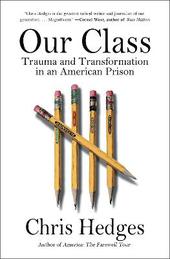
|
Our Class: Trauma and Transformation in an American Prison
Paperback / softback
Main Details
| Title |
Our Class: Trauma and Transformation in an American Prison
|
| Authors and Contributors |
By (author) Chris Hedges
|
| Physical Properties |
| Format:Paperback / softback | | Pages:272 | | Dimensions(mm): Height 213,Width 140 |
|
| ISBN/Barcode |
9781982154448
|
| Classifications | Dewey:365/.60922749 |
|---|
| Audience | |
|---|
| Illustrations |
1 b&w photo
|
|
Publishing Details |
| Publisher |
Simon & Schuster
|
| Imprint |
Simon & Schuster
|
| Publication Date |
11 October 2022 |
| Publication Country |
United States
|
Description
A powerfully moving book that "could make graspable why today's prisons are contemporary slave plantations" (Alice Walker, author of The Color Purple), giving voice to the poorest among us and laying bare the cruelty of a penal system that too often defines their lives. Pulitzer Prize-winning journalist Chris Hedges has taught courses in drama, literature, philosophy, and history since 2013 in the college degree program offered by Rutgers University at East Jersey State Prison and other New Jersey prisons. In his first class at East Jersey State Prison, where students read and discussed plays by Amiri Baraka and August Wilson, among others, his class set out to write a play of their own. In writing the play, Caged, which would run for a month in 2018 to sold-out audiences at The Passage Theatre in Trenton, New Jersey, and later be published, students gave words to the grief and suffering they and their families have endured, as well as to their hopes and dreams. The class's artistic and personal discovery, as well as transformation, is chronicled in heartbreaking detail in Our Class. This "magnificent" (Cornel West, author of Race Matters) book gives a human face and a voice to those our society too often demonizes and abandons. It exposes the terrible crucible and injustice of America's penal system and the struggle by those trapped within its embrace to live lives of dignity, meaning, and purpose.
Author Biography
Chris Hedges is a Pulitzer Prize-winning journalist who was a foreign correspondent and bureau chief in the Middle East and the Balkans for fifteen years for The New York Times. He previously worked overseas for The Dallas Morning News, The Christian Science Monitor, and NPR. He is host of the Emmy Award -nominated RT America show On Contact. Hedges, who holds a Master of Divinity from Harvard University, is the author of numerous books, and was a National Book Critics Circle finalist for War Is a Force That Gives Us Meaning. He has taught at Columbia University, New York University, Princeton University, and the University of Toronto. He has taught college credit courses through Rutgers University in the New Jersey prison system since 2013.
Reviews''Chris Hedges is the greatest radical writer and journalist of our generation! His courage and consistency are legendary! I shall never forget our teaching together at Rahway prison or our meetings with the greats Mumia Abu-Jamal and James Cone at Mahanoy prison. This magnificent book confirms his grand stature!'' -- Cornel West, author of Race Matters "This book could change everything. It could change our minds. It could buttress our hearts. It could make graspable why today's prisons are contemporary slave plantations. I couldn't put it down and I tried." -- Alice Walker, author of The Color Purple "Raw and intimate. . . . Combining searing, well-informed critiques of the U.S. criminal justice system with sympathetic character profiles and inspirational accounts of intellectual and emotional breakthroughs, this is a powerful look at how creative expression can provide 'a taste of freedom.'" * Publishers Weekly * "Chris Hedges opens the door for the long-buried talents of the incarcerated. In turn, they open the door to a new and valuable perspective for us all." -- Tom Fontana, Emmy Award-winning creator of "Oz" "Activist and Pulitzer Prize-winning journalist Hedges recounts his time teaching in a New Jersey prison. . . . Hedges is unsparingly critical of a carceral state that exists, it seems, only to warehouse those who have fallen afoul of it. . . . An affecting book in which every page urges more humane treatment of prisoners." -- Kirkus Reviews
|